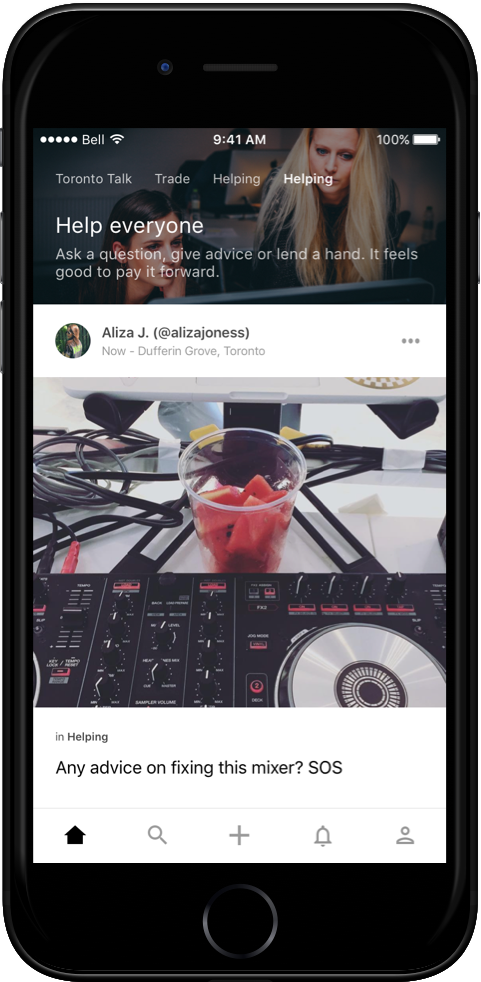When 30-year-old Montrealer Kat Rousseau decided she didn't need her old sneakers anymore, she traded them for tea and coffee instead of throwing them out. When an old Ikea desk wore out its welcome, she traded it for coconut milk. She found her barter partners on the Montreal edition of the popular Facebook group Bunz Trading Zone, but she later switched over to trading on the Bunz app because "there are lots of people in the group and your trades get lost quickly."
Advertisement
Bunz originally started on Facebook in 2013 as a secret group for cashless trading in Toronto, when founder Emily Bitze ran out of tomato sauce for her pasta dinner. Since then it's expanded to multiple cities across Canada. Bunz has grown a lot in the last year. When it launched its current app at the beginning of 2016, there were only 9,000 Facebook members. Today there are 60,000 Facebook users in Toronto alone, and over 100,000 app users globally.Now the Bunz team has set its sights higher.On Monday, Bunz rebranded from a troll logo to a sleek black-and-white set of smiling buns, and launched a revamped app called City Network, available globally, another big step to expansion. It's actively working to transfer existing Facebook community over to the app.
Image: Bunz
Their newly improved app's philosophy is based on what many users like Rousseau was attracted to Bunz in the first place. "It's really spectacular to be able to trust someone unknown to pull through. The majority of us have grown up to be wary of strangers."Read More: Toronto's Digital Barter Collective Swaps Booze, Pot, and Trinkets
With City Network, the Bunz crew hopes to fill the void that they believe the most widely used social networks created. They want to bring users out of their existing circles to interact with strangers, meet people with common interests, get information that will make living in a city easier, and trade without cash.
Advertisement
Uber might connect you to a driver you've never met, and Airbnb will allow you to stay at a stranger's home. But Bunz connects you to all aspects of life in your city, from finding someone who can teach you to make terrariums, to a chef offering empanada workshops, to the person who found your lost wallet."Bunz is not a social network. It's a City Network," claimed Sascha Mojtahedi, the Chief Executive Officer. "You look at your phone, you have a Facebook icon… What it represents to you is all the people you know," whether they live near or far, he said. Bunz, on the other hand, is "about connecting with all the people you don't know"—those "that are around you locally," in the same city as you.When I recently paid a visit to Bunz's minimalist office space in downtown Toronto, housed within a converted industrial building in the Entertainment District, Rishabh Varshney, the Chief Product Officer, allowed me to play around on his phone with a beta version of City Network.The original Bunz app was strictly for trades, while the Facebook group was filled with conversations—everything from how a baby raccoon was safely rescued, to where to find dollar taco specials. Those conversations now live in the new app's City Talk Feed, the section that founder Bitze was keen to create.
"After observing how the community was organizing themselves on Facebook, we wanted to make something that would make living in a city easier," she said. "We noticed that the app was missing the social aspect.""Maybe a philanthropist can fund it?"
Advertisement
The new Homes Zone section is for finding roommates, subletting or renting out parking spots. The Helping Zone is the common collective aspect of Bunz that was missing from the original app: a place to trace back a stolen bike, seek advice on the best way to juice a carrot, or thank a stranger who made the day more awesome.Bunz isn't charging its users. It's had a physical office since October 2015, but it has yet to bring in any revenue: their operation still runs on the seed funding that Mojtahedi and Bitze raised at the start of their partnership."We know what we are going to monetize but it's not going to happen just yet. This release is more philosophical in nature than about making money," Sarena Ally, the marketing lead, explained.
Image: Bunz
Several incidents suggest that the company may be open to sponsored posts from select advertisers. In November, the Red Cross gave away emergency kits hidden in mystery boxes across Toronto and released clues in the Bunz Facebook group for members to find. WayHome music and arts festival, held outside Toronto, did something similar with its tickets. Sponsored posts were craftily peppered into Bunz.Ally confirmed that sponsorships have taken place, and there are more in the pipeline. "We do allow some brands to play within the space as long as it's complementary," she said. "We've always been inclined in certain areas, like music, festivals and charities."
Advertisement
Since the Bunz team wasn't ready to spill their beans on whether and how they can make money, I asked some users for their own opinions.

Claire H., a 29-year-old lawyer in Vancouver with over ten trades on that city's local Bunz group under her belt, wouldn't mind seeing ads. "Ad revenue is tricky but [Bunz] should get paid for the service they provide," she said.River Wilson, a 38-year-old speech language pathologist and mom of two from Edmonton, was optimistic. "Maybe a philanthropist can fund it?"Sharing economy expert Ryan Dyment, who's the executive director of the nonprofit Institute for A Resourced-Based Economy in Toronto, thinks charging a membership fee for a cashless community is counterintuitive. He thinks Bunz can monetize through hosting events by selling tickets or rallying sponsors. A trade-a-thon or potluck meetup could solidify the community IRL.In the meantime, the Bunz team is hoping that the City Network will turn strangers into neighbours, make living in a city easier and put them on a path towards profitability.Get six of our favorite Motherboard stories every day by signing up for our newsletter.
